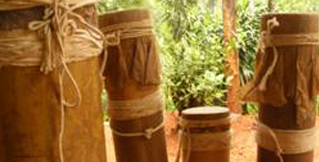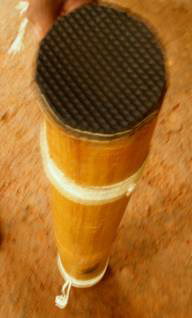“Culture nourishes itself from nature. Without nature, culture cannot exist; without culture, a society cannot.” |

Bamboo Orchestra |
||||
The one-dimensional view of progress, widely favored by economists and development experts, has helped to mask the negative impact of economic growth. This has led to a grave misunderstanding of the situation of the majority of people on earth today—the millions in the rural sector of the Third World—and has disguised the fact that development programs, far from benefiting these people, have, in many cases, served only to lower their standard of living.” quotes renowned ecologist Helena Norberg Hodge. It is easy to declare that large scale globalization with its emphasis on commercial monopoly is responsible for the present crisis of vanishing cultures but with the scarcity of initiatives to restore the traditional knowledge system the marginalization process of indigenous identity is all the more accentuated. Vayali in this sense represent the former. Vayali since its time of inception has been actively committed in reviving the traditional art forms, folklore and ethno-music and acknowledged the cultural significance of the traditional knowledge system of the indigenous tribes of Kerala and has chosen a sustainable holistic model for its expression. The philosophy of Bamboo Orchestra--in anticipation of the new century--is to compose music which could be shared by all from the heart through "the very resonating sound" derived from bamboo, natural material in nature. The creation of bamboo music transcends all ethnic identities, personalities, multitudes of music knowledge and genres when each person humbly faces the bamboo--one of nature's gifts--and its resonating sound. The process of such creative musical synthesis results in the evolution of new relationships between nature and people, and between people themselves |
||||
The Vayali Bamboo orchestra is one such initiative. Vayali got its first taste of Bamboo orchestra at the 2006 Traditional Music and Rhythm festival in Japan. The Vayali Bamboo orchestra in the past has incorporated traditional folk music and given a whole new appeal to the depleting interest in ethno-music. The process of putting together an assortment of folk music was however was not easy. The communities from which the information on folk music was sought were apprehensive to begin with since these were specific to specific occasion and specific communities. Through rigorous attempts at acquainting them about the significance of folk music and the value of passing it to the younger generations people of different communities have opened up considerably. Through its incorporation of folklore, music and instruments Vayali has stressed on the importance of preserving the essence of one’s culture but equally understands the need to tap creative energies that is inherent amongst the youth. Vayali Bamboo Orchestra exemplifies this objective. For instance Chenda, a cylindrical percussion instrument popular in Kerala widely used as an accompaniment for Kathakali, Koodiyatam etc has been included to render a distinct rustic sound. Vayali Bamboo Orchestra purely because of its novelty not only does it leave an enduring impression on the minds of the youth to take up this art-form but folk music in general. At a creative level it is platform to look beyond conventions and strict formats and improvise and subsequently exercise this freedom to the fullest by blending different styles of folk music and indigenous instruments. “It is encouraging to witness the kind of response we have received from the people especially indigenous children and youth and most significantly connect to their roots. Bamboo orchestra in a way is the expression of this self confidence collectively felt by the people”, opines Sujil Kumar one of the member of the Vayali Bamboo Orchestra. |
||||
The Vayali Bamboo Orchestra continues to enthrall audiences far and wide. It has had the privileged opportunity to perform at the ‘Kerela Kalamandalam’ – |
||||
 |
* Mulam Chenda- a cylindrical percussion instrument that is inspired by the Chenda. Mulam in Malayalam means Bamboo. Its ends that are left open and struck with sticks tied to a rubber sponge. |
|||
 |
* Thennal aka Mezha Mooli- Small bamboo spikes are meticulously arranged to give a labyrinth into which seeds of green gram and red wood tree are put .the tube when rotated or slanted produces a serene sound like that of a flowing stream. The ends are closed. |
|||
 |
* This instrument somewhat resembles the slit drum. The ends of the drum are closed. Each drum is divided into two compartments and consists of parallel “H” shape slits and is struck with a stick with rubber sponge at the bottom and produces as many as four distinct pitches. |
|||
 |
* These cylindrical instruments are characteristic of the African ‘Conga’. The drumhead is a calf-skin cover fastened with strings of rope while the base is left open and struck with bare hands. |
|||
 |
* This cylindrical bass instrument has a rubber sheet nailed on one side while the other end is left open and on both sides with rope to produce a low and coarse bass line involving graduating and descending pitch. |
|||
supported by: TheBlueYonder All rights Reserved to Vayali. © Copyright 2009 - 2018 Powered by: Opsotech Infomedia |